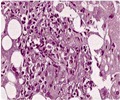Identifying the role of the new hormone could help tackle the deadly pneumonia causing bacteria and help save lives of susceptible patients.
Highlights
- Pathogens are increasingly becoming resistant to treatment and the choice of antibiotics to treat infections is limited.
- Stimulating the production of the hormone hepcidin, produced by the liver, limits the spread of the bacteria that causes pneumonia.
- Hepcidin helps by hiding the iron in blood from the bacteria thus preventing its growth and survival.
Bacteria are growing increasingly resistant to antibiotics and the treatment options are diminishing.
Inducing the production of hepcidin in patients who do not produce it well, such as people with iron overload or liver disease, may help their bodies effectively tackle the bacteria by starving it to death.
That finding could be lifesaving for these vulnerable patients.
"The rate at which these organisms become resistant to antibiotics is far faster than the rate at which we come up with new antibiotics. It's a race, and they're winning it," said researcher Borna Mehrad, MBBS, of UVA's Division of Pulmonary and Critical Care Medicine. "Increasingly, the choice of antibiotics to treat these infections is more and more limited, and there are occasions where there just isn't an antibiotic to treat with, which is a very scary and dangerous situation."
The research team from the University of California, Los Angeles, found that mice that had been genetically modified to lack hepcidin were particularly susceptible to bacterial pneumonia. All the mice were killed because the lack of hepcidin resulted in the spread of bacteria from the lungs into their bloodstream.
Many people lack the hormone because of genetic illnesses or liver disease.
"It's quite common," said Kathryn Michels, graduate student and first author of a manuscript outlining the findings. "We think this line of research is very relevant to the many people who can't make this hormone very well and are, clinically, very susceptible to these infections."
A drug, that has been developed to treat chronic iron overload, such as is seen in people with hereditary hemochromatosis, has been found to mimic the function of hepcidin and could be used to decrease the iron levels in the blood of pneumonia patients who lack hepcidin.
"We think that short-term treatment with this drug should be an effective way of treating these [pneumonia] infections," Mehrad said. "At least in mice, it seems to work extremely well."
The findings have been published online by the scientific journal JCI Insight.
Reference
- Borna Mehrad et al. Hepcidin-mediated iron sequestration protects against bacterial dissemination during pneumonia. JCI Insight; (2017) doi.org/10.1172/jci.insight.92002
Source-Medindia















